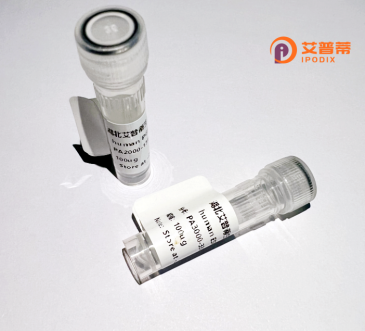
| 纯度 | >90%SDS-PAGE. |
| 种属 | Human |
| 靶点 | UBXD7 |
| Uniprot No | O94888 |
| 内毒素 | < 0.01EU/μg |
| 表达宿主 | E.coli |
| 表达区间 | 2-489 aa |
| 活性数据 | AAHGGSAAS SALKGLIQQF TTITGASESV GKHMLEACNN NLEMAVTMFL DGGGIAEEPS TSSASVSTVR PHTEEEVRAP IPQKQEILVE PEPLFGAPKR RRPARSIFDG FRDFQTETIR QEQELRNGGA IDKKLTTLAD LFRPPIDLMH KGSFETAKEC GQMQNKWLMI NIQNVQDFAC QCLNRDVWSN EAVKNIIREH FIFWQVYHDS EEGQRYIQFY KLGDFPYVSI LDPRTGQKLV EWHQLDVSSF LDQVTGFLGE HGQLDGLSSS PPKKCARSES LIDASEDSQL EAAIRASLQE THFDSTQTKQ DSRSDEESES ELFSGSEEFI SVCGSDEEEE VENLAKSRKS PHKDLGHRKE ENRRPLTEPP VRTDPGTATN HQGLPAVDSE ILEMPPEKAD GVVEGIDVNG PKAQLMLRYP DGKREQITLP EQAKLLALVK HVQSKGYPNE RFELLTNFPR RKLSHLDYDI TLQEAGLCPQ ETVFVQERN |
| 分子量 | 54.8 kDa |
| 蛋白标签 | His tag N-Terminus |
| 缓冲液 | PBS, pH7.4, containing 0.01% SKL, 1mM DTT, 5% Trehalose and Proclin300. |
| 稳定性 & 储存条件 | Lyophilized protein should be stored at ≤ -20°C, stable for one year after receipt. Reconstituted protein solution can be stored at 2-8°C for 2-7 days. Aliquots of reconstituted samples are stable at ≤ -20°C for 3 months. |
| 复溶 | Always centrifuge tubes before opening.Do not mix by vortex or pipetting. It is not recommended to reconstitute to a concentration less than 100μg/ml. Dissolve the lyophilized protein in distilled water. Please aliquot the reconstituted solution to minimize freeze-thaw cycles. |
1. **"UBXD7 binds UBX domain to VCP/p97 and participates in ERAD"**
- **作者**: Meyer HH, et al.
- **摘要**: 研究发现UBXD7通过UBX结构域与VCP/p97相互作用,参与内质网相关降解(ERAD)途径,调控错误折叠蛋白的泛素化与清除。
2. **"Structural basis of UBX domain-mediated assembly in UBXD7"**
- **作者**: Suzuki T, et al.
- **摘要**: 通过晶体结构解析,阐明UBXD7中UBX结构域的构象及其与适配蛋白的结合模式,揭示其作为分子支架的潜在功能。
3. **"UBXD7 regulates cell cycle progression via CDC48 interaction"**
- **作者**: Cheng J, et al.
- **摘要**: 实验表明重组UBXD7通过结合CDC48复合体调控细胞周期G1/S期转换,突变UBX结构域会破坏该功能,提示其在肿瘤中的潜在作用。
4. **"Recombinant UBXD7 mitigates protein aggregation in neurodegenerative models"**
- **作者**: Wang L, et al.
- **摘要**: 利用重组UBXD7蛋白在细胞模型中发现其促进异常蛋白聚集体的清除,可能为阿尔茨海默病等神经退行性疾病提供治疗策略。
UBXD7 (UBX domain-containing protein 7) is a member of the UBX protein family, characterized by a conserved UBX domain that facilitates interactions with AAA ATPase complexes like p97/VCP, a key regulator of cellular proteostasis. Primarily localized to the endoplasmic reticulum (ER), UBXD7 is implicated in ER-associated degradation (ERAD), a process that tags misfolded ER proteins for ubiquitination and subsequent proteasomal degradation. Structural studies suggest it contains an N-terminal transmembrane domain, a central UBX domain, and a C-terminal region mediating substrate recognition. As a recombinant protein, human UBXD7 is often expressed in mammalian or bacterial systems with affinity tags (e.g., His-tag) to study its biochemical functions, binding partners, and role in ER stress responses. Research links UBXD7 to pathologies such as cancer and neurodegenerative diseases, where dysregulated ERAD contributes to disease progression. Its recombinant form enables exploration of mechanistic details, including how p97/VCP coordination and substrate specificity are regulated during protein quality control. Current studies also investigate UBXD7’s potential as a therapeutic target to modulate ERAD in disease contexts.
×